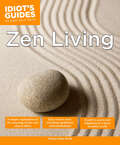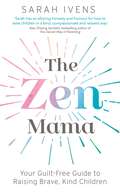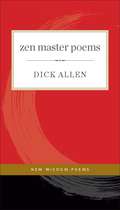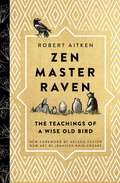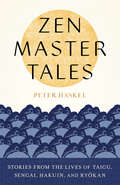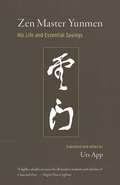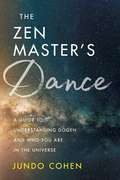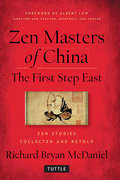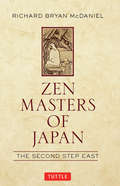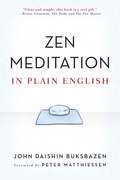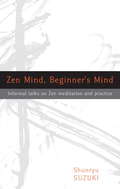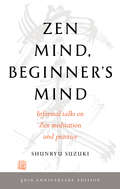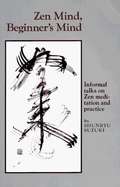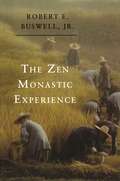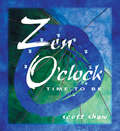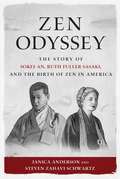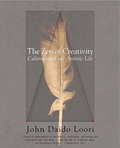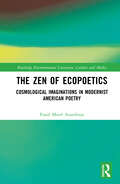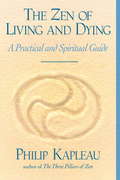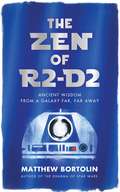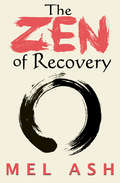- Table View
- List View
Zen Living: A Simple Explanation of the Meaning of Zen and What It Offers (Idiot's Guides)
by Domyo Sater BurkIn today's fast-paced, technology-laden society, it's easy to become overwhelmed. People seek calm and simplicity, but have a hard time realizing a "Zen" life. Monk and sensei Domyo Sater Burk illustrates how to get started on the path to peace and enlightenment, regardless of cultural or religious affiliation. You'll learn the foundation and essential teachings of Zen practice, how to engage in meditation and mindfulness, and how to live daily within a Zen moral code.
The Zen Mama: Your guilt-free guide to raising brave, kind children
by Sarah IvensLet go of parenting expectations and fears to raise courageous, confident children.The Zen Mama philosophy is that mother and child complement each other in adventures and experiences, always putting safety first but without getting caught up in the anxieties, drama, impossible expectations and mental baggage that too often comes along with modern parenting. Learning to become a Zen Mama will help you grow and nurture a Zen Child - someone who isn't afraid to be different, who can stand up for himself or his friends, and can travel the world and experiment with new things without being overwhelmed with self-doubt or being scared. Full of facts, actionable advice and practical tips, this book will be about combining the heart and the head with what works for you and your family, not comparing yourselves to others or meeting a societal standard. It will support and nurture the mother's journey like a wise and sympathetic friend and offers ideas and experience rather than judgement.The Zen Mama will help you to find your purpose as a mother. It will instil the self-belief you need to help create a resilient, creative, caring and smart child - and help to survive the journey.
The Zen Mama: Your guilt-free guide to raising brave, kind children
by Sarah IvensLet go of parenting expectations and fears to raise courageous, confident children.The Zen Mama philosophy is that mother and child complement each other in adventures and experiences, always putting safety first but without getting caught up in the anxieties, drama, impossible expectations and mental baggage that too often comes along with modern parenting. Learning to become a Zen Mama will help you grow and nurture a Zen Child - someone who isn't afraid to be different, who can stand up for himself or his friends, and can travel the world and experiment with new things without being overwhelmed with self-doubt or being scared. Full of facts, actionable advice and practical tips, this book will be about combining the heart and the head with what works for you and your family, not comparing yourselves to others or meeting a societal standard. It will support and nurture the mother's journey like a wise and sympathetic friend and offers ideas and experience rather than judgement.The Zen Mama will help you to find your purpose as a mother. It will instil the self-belief you need to help create a resilient, creative, caring and smart child - and help to survive the journey.
Zen Master Poems
by Dick AllenA unique voice in American poetry evocative of Han Shan's Zen verses, Pablo Neruda's Book of Questions, and the writings of Jack Kerouac.What a long conversation we never had! All those rivers? we never crossed together. You so busy with your own life, I so busy with mine. Dick Allen, one of the founders of the Expansive Poetry movement, has won the Robert Frost Prize, the Hart Crane Poetry Prize, and the Pushcart Prize--among others. His work has been anthologized five times in the Best American Poetry volumes, and has appeared in The New Yorker, The Atlantic Monthly, Tricycle, The Buddhist Poetry Review, and The American Poetry Review, as well as numerous other publications. He's a former fellow of the National Endowment for the Arts, and a former Poet Laureate for the state of Connecticut, where he lives and writes.
Zen Master Raven: The Teachings of a Wise Old Bird
by Jennifer Rain Crosby Nelson Foster Robert AitkenA uniquely playful and incisive collection of Zen teaching stories from a beloved American master.A Modern Classic. In the tradition of the great koan collections and the records of ancient masters, Robert Aitken distills a lifetime of teaching down to its essence. Intriguing and deceptively simple, Zen Master Raven is a brilliant encapsulation of Zen in over a hundred koan-like encounters alongside many charming illustrations. Featuring curious beginners like Mallard and Mole and profound teachers like Brown Bear, Moose Roshi, and Zen Master Raven himself, this classic of contemporary Zen and will inspire seekers for generations to come.
Zen Master Tales: Stories from the Lives of Taigu, Sengai, Hakuin, and Ryokan
by Peter HaskelA lively collection of folk tales and Buddhist teaching stories from four noted premodern Japanese Zen masters: Taigu Sôchiku (1584–1669), Sengai Gibon (1750-1831), Hakuin Ekaku (1686-1769), and Taigu Ryôkan (1758-1831). Zen Master Tales collects never before translated stories of four prominent Zen masters from the Edo period of Japanese history (1603-1868). Drawn from an era that saw the &“democratization&” of Japanese Zen, these stories paint a picture of robust, funny, and poignant engagement between Zen luminaries and the emergent chоnin or &“townsperson&” culture of early modern Japan. Here we find Zen monks engaging with samurai, merchants, housewives, entertainers, and farmers. These masters affirmed that the essentials of Zen practice—zazen, koan study, even enlightenment—could be conveyed to all members of Japanese society in ordinary speech, including even comic verse and work songs. Against the backdrop of this rich tableau, Zen Master Tales serves not only as a text for Zen students but also as a wide-ranging window onto the fascinating literary, material, and social history of Edo Japan. In his introduction, translator Peter Haskel explains the history of Zen &“stories&” from the tradition&’s Golden Age in China through the compilation of the classic koan collections and on to the era from which the stories in Zen Master Tales are drawn. What was true of the Chinese tradition, he writes—&“its focus on the individual&’s ordinary activity as the function, the manifestation of the absolute&”—continued in the Japanese context. &“Most of these Japanese stories, however unabashedly humorous and at times crude, impart something of the character of the Zen masters involved, whose attainment must be plainly manifest in even the most humble and unlikely of situations.&”
Zen Master Yunmen: His Life and Essential Sayings
by Urs AppA modern Zen classic--reissued with new material: An introduction to the great tenth-century Chinese master, with translations of his key works.Yunmen Wenyan (c. 864–949) was a master of the Chinese Zen (Chan) tradition and one of the most influential teachers in its history, showing up in many famous koans—in one of which he’s credited with the famous line, “Every day is a good day.” His teachings are said to permeate heaven and earth, to address immediately and totally the state and conditions of his audience, and to cut off even the slightest trace of duality. In this classic study of Master Yunmen, historian and Buddhist scholar Urs App clearly elucidates the encompassing and penetrating nature of Yunmen’s teachings, provides pioneering translations of his numerous talks and dialogues, and includes a brief history of Chinese Zen, a biography of the master, and a wealth of resource materials.
The Zen Master's Dance: A Guide to Understanding Dogen and Who You Are in the Universe
by Jundo CohenZen Master's Dance makes some of Zen&’s subtlest teaching deeply personal and freshly accessible.Eihei Dogen—the thirteenth-century Japanese Zen Master of peerless depth and subtlety—heard the music of the universe that sounds as all events and places, people, things, and spaces. He experienced reality as a great dance moving through time, coming to life in the thoughts and acts of all beings. It is a most special dance, the dance that the whole of reality is dancing, with nothing left out. All beings are dancing, and reality is dancing as all beings. In The Zen Master&’s Dance, Jundo Cohen takes us deep into the mind of Master Dogen—and shows us how to join in the great and intimate dance of the universe. Through fresh translations and sparkling teaching, Cohen opens up for us a new way to read one of Buddhism&’s most remarkable spiritual geniuses.
Zen Masters of China
by Albert Low Richard Bryan Mcdaniel[Zen Masters of China presents more than 300 traditional Zen stories and koans, far more than any other collection. Retelling them in their proper place in Zen's historical journey, it also tells a larger story: how, in taking the first step east from India to China, Buddhism began to be Zen.]The stories of Zen are unlike any other writing, religious or otherwise. Used for centuries by Zen teachers as aids to bring about or deepen the experience of awakening, they have a freshness that goes beyond religious practice and a mystery and authenticity that appeal to a wide range of readers.[Placed in chronological order, these stories tell the story of Zen itself, how it traveled from West to East but also how it was transformed in that journey, from an Indian practice to something different in China (Ch'an) and then more different still in Japan (Zen). The fact that its transmission was so human, from teacher to student in a long chain from West to East, meant that the cultures it passed through inevitably changed it.Zen Masters of China is first and foremost a collection of mind-bending Zen stories and their wisdom. More than that, without academic pretensions or baggage, it recounts the genealogy of Zen Buddhism in China and, through the stories themselves, illuminates how Zen became what it is today.]
Zen Masters of China: The First Step East
by Richard Bryan Mcdaniel Albert Low[Zen Masters of China presents more than 300 traditional Zen stories and koans, far more than any other collection. Retelling them in their proper place in Zen's historical journey, it also tells a larger story: how, in taking the first step east from India to China, Buddhism began to be Zen.]The stories of Zen are unlike any other writing, religious or otherwise. Used for centuries by Zen teachers as aids to bring about or deepen the experience of awakening, they have a freshness that goes beyond religious practice and a mystery and authenticity that appeal to a wide range of readers.[Placed in chronological order, these stories tell the story of Zen itself, how it traveled from West to East but also how it was transformed in that journey, from an Indian practice to something different in China (Ch'an) and then more different still in Japan (Zen). The fact that its transmission was so human, from teacher to student in a long chain from West to East, meant that the cultures it passed through inevitably changed it.Zen Masters of China is first and foremost a collection of mind-bending Zen stories and their wisdom. More than that, without academic pretensions or baggage, it recounts the genealogy of Zen Buddhism in China and, through the stories themselves, illuminates how Zen became what it is today.]
Zen Masters of China
by Richard Bryan Mcdaniel Albert Low[Zen Masters of China presents more than 300 traditional Zen stories and koans, far more than any other collection. Retelling them in their proper place in Zen's historical journey, it also tells a larger story: how, in taking the first step east from India to China, Buddhism began to be Zen.]The stories of Zen are unlike any other writing, religious or otherwise. Used for centuries by Zen teachers as aids to bring about or deepen the experience of awakening, they have a freshness that goes beyond religious practice and a mystery and authenticity that appeal to a wide range of readers.[Placed in chronological order, these stories tell the story of Zen itself, how it traveled from West to East but also how it was transformed in that journey, from an Indian practice to something different in China (Ch'an) and then more different still in Japan (Zen). The fact that its transmission was so human, from teacher to student in a long chain from West to East, meant that the cultures it passed through inevitably changed it.Zen Masters of China is first and foremost a collection of mind-bending Zen stories and their wisdom. More than that, without academic pretensions or baggage, it recounts the genealogy of Zen Buddhism in China and, through the stories themselves, illuminates how Zen became what it is today.]
Zen Masters of Japan
by Richard Bryan McdanielZen Masters of Japan is the second book in a series that traces Zen's profoundly historic journey as it spread eastward from China and Japan, toward the United States. Following Zen Masters of China, this book concentrates on Zen's significant passage through Japan. More specifically, it describes the lineage of the great teachers, the Pioneers who set out to enlighten an island ready for an inner transformation based on compassionate awareness.While the existing Buddhist establishment in Japan met early Zen pioneers like Dogen and Eisai with fervent resistance, Zen Buddhism ultimately perservered and continued to become further transformed in its passage through Japan. The Japanese culture and Japanese Buddhism practices further deepened and strengthened Zen training by combining it with a variety of esoteric contemplative arts-the arts of poetry, the tea ceremony, calligraphy, and archery. Zen Masters of Japan chronicles this journey, and shows how the new practices soon gained in popularity among all walks of life-from the lowly peasant, offering a hope of reincarnation and a better life; to the Samurai warrior due to its casual approach to death; to the ruling classes, challenging the intelligentsia because of its scholarly roots. A collection of Zen stories, meditation, and their wisdom, Zen Masters of Japan also explores the illusive state of 'No Mind' achieved in Japan that is so fundamental to Zen practices today.
Zen Masters of Japan
by Richard Bryan McdanielZen Masters of Japan is the second book in a series that traces Zen's profoundly historic journey as it spread eastward from China and Japan, toward the United States. Following Zen Masters of China, this book concentrates on Zen's significant passage through Japan. More specifically, it describes the lineage of the great teachers, the Pioneers who set out to enlighten an island ready for an inner transformation based on compassionate awareness.While the existing Buddhist establishment in Japan met early Zen pioneers like Dogen and Eisai with fervent resistance, Zen Buddhism ultimately perservered and continued to become further transformed in its passage through Japan. The Japanese culture and Japanese Buddhism practices further deepened and strengthened Zen training by combining it with a variety of esoteric contemplative arts-the arts of poetry, the tea ceremony, calligraphy, and archery. Zen Masters of Japan chronicles this journey, and shows how the new practices soon gained in popularity among all walks of life-from the lowly peasant, offering a hope of reincarnation and a better life; to the Samurai warrior due to its casual approach to death; to the ruling classes, challenging the intelligentsia because of its scholarly roots. A collection of Zen stories, meditation, and their wisdom, Zen Masters of Japan also explores the illusive state of 'No Mind' achieved in Japan that is so fundamental to Zen practices today.
Zen Meditation in Plain English
by Peter Matthiessen John Daishin BuksbazenAn excellent, practical introduction to Zen meditation. Written in a warm and easily accessible style, this book appeals to anyone with an interest in meditation, Zen, or, as is often the case today, a combination of the two. The book emphasizes the importance of receiving good instruction and of finding groups to practice with, yet it lays out the necessary steps to practice Zen meditation on your own. The book includes easily followed exercises to help the reader along. For anyone looking to uncover a clear and insightful path into the philosophy and practice of Zen meditation, this book represents the culmination of that search.
Zen Mind, Beginner's Mind
by David Chadwick Shunryu Suzuki"In the beginner's mind there are many possibilities, but in the expert's there are few." So begins this most beloved of all American Zen books. Seldom has such a small handful of words provided a teaching as rich as has this famous opening line. In a single stroke, the simple sentence cuts through the pervasive tendency students have of getting so close to Zen as to completely miss what it's all about. An instant teaching on the first page. And that's just the beginning. In the forty years since its original publication, Zen Mind, Beginner's Mind has become one of the great modern Zen classics, much beloved, much reread, and much recommended as the best first book to read on Zen. Suzuki Roshi presents the basics--from the details of posture and breathing in zazen to the perception of nonduality--in a way that is not only remarkably clear, but that also resonates with the joy of insight from the first to the last page. It's a book to come back to time and time again as an inspiration to practice, and it is now available to a new generation of seekers in this fortieth anniversary edition, with a new afterword by Shunryu Suzuki's biographer, David Chadwick.
Zen Mind, Beginner's Mind: 50th Anniversary Edition
by Shunryu SuzukiNamed one of the 100 Best Spiritual Books of the Twentieth Century (Spirituality & Practice)A 50th Anniversary edition of the bestselling Zen classic on meditation, maintaining a curious and open mind, and living with simplicity."In the beginner's mind there are many possibilities, but in the expert's there are few."So begins this most beloved of all American Zen books. Seldom has such a small handful of words provided a teaching as rich as has this famous opening line. In a single stroke, the simple sentence cuts through the pervasive tendency students have of getting so close to Zen as to completely miss what it's all about. It is an instant teaching on the first page--and that's just the beginning.In the fifty years since its original publication, Zen Mind, Beginner's Mind has become one of the great modern spiritual classics, much beloved, much reread, and much recommended as the best first book to read on Zen. Suzuki Roshi presents the basics--from the details of posture and breathing in zazen to the perception of nonduality--in a way that is not only remarkably clear, but that also resonates with the joy of insight from the first to the last page.
Zen Mind, Beginner's Mind
by Shunryu Suzuki Trudy DixonZen mind is one of those enigmatic phrases used by Zen teachers to throw you back upon yourself, to make you go behind the words themselves and begin wondering. "I know what my own mind is," you tell yourself, "but what is Zen mind?" And then: "But do I really know what my own mind is?" Is it what I am doing now? Is it what I am thinking now?" And if you should then try to sit physically still for a while to see if you can locate it--then you have begun the practice of Zen, then you have begun to realize the unrestricted mind. The innocence of this first inquiry--just asking what you are--is beginner's mind. The mind of the beginner is needed throughout Zen practice. It is the open mind, the attitude that includes both doubt and possibility, the ability to see things always as fresh and new. It is needed in all aspects of life. Beginner's mind is the practice of Zen mind. This book originated from a series of talks given by Zen Master Shunryu Suzuki to a small group in Los Altos, California. He joined their meditation periods once a week and afterwards answered their questions and tried to encourage them in their practice of Zen and help them solve the problems of life. His approach is informal, and he draws his examples from ordinary events and common sense. Zen is now and here, he is saying; it can be as meaningful for the West as for the East. But his fundamental teaching and practice are drawn from all the centuries of Zen Buddhism and especially from Dogen, one of the most important and creative of all Zen Masters.
The Zen Monastic Experience: Buddhist Practice in Contemporary Korea
by Robert E. BuswellRobert Buswell, a Buddhist scholar who spent five years as a Zen monk in Korea, draws on personal experience in this insightful account of day-to-day Zen monastic practice. In discussing the activities of the postulants, the meditation monks, the teachers and administrators, and the support monks of the monastery of Songgwang-sa, Buswell reveals a religious tradition that differs radically from the stereotype prevalent in the West. The author's treatment lucidly relates contemporary Zen practice to the historical development of the tradition and to Korean history more generally, and his portrayal of the life of modern Zen monks in Korea provides an innovative and provocative look at Zen from the inside.
Zen O'Clock: Time to Be
by Scott ShawA new way to look at clocks and calendars—and learn to live more peacefully in the present. Imagine being able to step beyond the controlling hands of clocks, calendars, and schedules to discover the mystical process that will give you an entirely new perspective of time. Inside this book are insightful aphorisms that will help you live more peacefully in the present. With each page, Scott Shaw, an expert in meditative consciousness, helps you throw away phrases like &“wasted time&” and &“time constraints&”—and understand the difference between what time is and what we perceive it to be. Imagine, right now, time in your hands!
Zen Odyssey: The Story of Sokei-an, Ruth Fuller Sasaki, and the Birth of Zen in
by Janica Anderson Steven Schwartz Sean Murphy Joan WattsExplore two lives—and a relationship—that profoundly shaped American Zen.Ruth Fuller Sasaki and Sokei-an Shigetsu Sasaki: two pioneers of Zen in the West. Ruth was an American with a privileged life, even during the height of the Great Depression, before she went to Japan and met D. T. Suzuki. Sokei-an was one of the first Zen priests to come to America; he brought the gift of the Dharma to the United States but in 1942 was put in an internment camp. One made his way to the West and the other would find her way to the East, but together they created the First Zen Institute of America and helped birth a new generation of Zen practitioners: among them, Alan Watts, Gary Snyder, and Burton Watson. They were married less than a year before Sokei-an died, but Ruth would go on to helm trailblazing translations in his honor and to become the first foreigner to be the priest of a Rinzai Zen temple in Japan. With lyrical prose, authors Steven Schwartz and Janica Anderson bring Ruth and Sokei-an to life. Two dozen intimate photographs photos show us two people who aren’t mere historical figures, but flesh and blood people, walking their paths.
The Zen of Creativity
by John Daido LooriFor many of us, the return of Zen conjures up images of rock gardens and gently flowing waterfalls. We think of mindfulness and meditation, immersion in a state of being where meaning is found through simplicity. Zen lore has been absorbed by Western practitioners and pop culture alike, yet there is a specific area of this ancient tradition that hasn't been fully explored in the West. Now, in The Zen of Creativity, American Zen master John Daido Loori presents a book that taps the principles of the Zen arts and aesthetic as a means to unlock creativity and find freedom in the various dimensions of our existence. Loori dissolves the barriers between art and spirituality, opening up the possibility of meeting life with spontaneity, grace, and peace.Zen Buddhism is steeped in the arts. In spiritual ways, calligraphy, poetry, painting, the tea ceremony, and flower arranging can point us toward our essential, boundless nature. Brilliantly interpreting the teachings of the artless arts, Loori illuminates various elements that awaken our creativity, among them still point, the center of each moment that focuses on the tranquility within; simplicity, in which the creative process is uncluttered and unlimited, like a cloudless sky; spontaneity, a way to navigate through life without preconceptions, with a freshness in which everything becomes new; mystery, a sense of trust in the unknown; creative feedback, the systematic use of an audience to receive noncritical input about our art; art koans, exercises based on paradoxical questions that can be resolved only through artistic expression. Loori shows how these elements interpenetrate and function not only in art, but in all our endeavors.Beautifully illustrated and punctuated with poems and reflections from Loori's own spiritual journey, The Zen of Creativity presents a multilayered, bottomless source of insight into our creativity. Appealing equally to spiritual seekers, artists, and veteran Buddhist practitioners, this book is perfect for those wishing to discover new means of self-awareness and expression--and to restore equanimity and freedom amid the vicissitudes of our lives.From the Hardcover edition.
The Zen of Ecopoetics: Cosmological Imaginations in Modernist American Poetry (Routledge Environmental Literature, Culture and Media)
by Enaiê Mairê AzambujaThis book is the first comprehensive study investigating the cultural affinities and resonances of Zen in early twentieth-century American poetry and its contribution to current definitions of ecopoetics, focusing on four key poets: William Carlos Williams, Marianne Moore, Wallace Stevens, and E.E. Cummings. Bringing together a range of texts and perspectives and using an interdisciplinary approach that draws on Eastern and Western philosophies, including Zen and Taoism, posthumanism and new materialism, this book adds to and extends the field of ecocriticism into new debates. Its broad approach, informed by literary studies, ecocriticism, and religious studies, proposes the expansion of ecopoetics to include the relationship between poetic materiality and spirituality. It develops ‘cosmopoetics’ as a new literary-theoretical concept of the poetic imagination as a contemplative means to achieving a deeper understanding of the human interdependence with the non-human. Addressing the critical gap between materialism and spirituality in modernist American poetry, The Zen of Ecopoetics promotes new forms of awareness and understanding about our relationship with non-human beings and environments. It will be of interest to scholars, researchers, and students in ecocriticism, literary theory, poetry, and religious studies.
The Zen of Living and Dying: A Practical and Spiritual Guide
by Philip KapleauTo live life fully and die serenely--surely we all share these goals, so inextricably entwined. Yet a spiritual dimension is too often lacking in the attitudes, circumstances, and rites of death in modern society. Kapleau explores the subject of death and dying on a deeply personal level, interweaving the writings of Western religions with insights from his own Zen practice, and offers practical advice for the dying and their families.
The Zen of R2-D2: Ancient Wisdom from a Galaxy Far, Far Away
by Matthew BortolinEntertaining and engaging, this new follow-up to Wisdom&’s bestseller The Dharma of Star Wars stands on its own and will captivate a broad audience with the Star Wars story from a Buddhist perspective.Did you ever wonder why R2-D2 is: Always calm and cool under pressure, The key to the rebellion&’s survival, The one who never fails to save the day? Could it be because he&’s secretly a Zen master? Discover your inner R2—and the truth about who you really are! This delightful and illuminating romp unfolds in the form of a fictional dialogue between the author—a die-hard Star Wars devotee with a deep connection to Zen—and two cosplayers dressed as C-3PO and R2-D2 who insist on being called by their character names. Along the way, you&’ll come to see what everyone&’s favorite astromech can teach us about peace, happiness, and life&’s true meaning.
The Zen of Recovery
by Mel AshA practical synthesis of AA&’s Twelve Steps and Zen&’s Eightfold Path. In this compelling blend of East and West, Mel Ash shows how Zen mind and practice connect to the heart of recovery. Courageously drawing from his lifetime of experience as an abused child, alcoholic, Zen student, and dharma teacher, Ash presents a practical synthesis of Alcoholics Anonymous&’s Twelve Steps and Zen&’s Eightfold Path. You don&’t have to be Buddhist to appreciate the healing power of The Zen of Recovery. The book makes Zen available to all seeking to improve the quality of their spiritual and everyday lives. It also includes practical instructions on how to meditate and put the book into action. Its message will help readers live more profoundly &“one day at a time.&”
